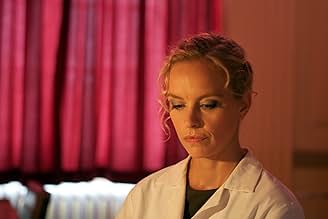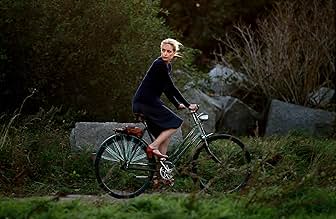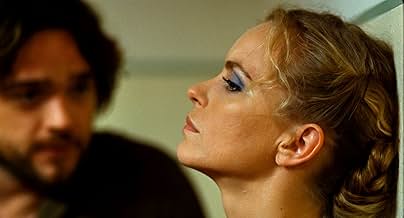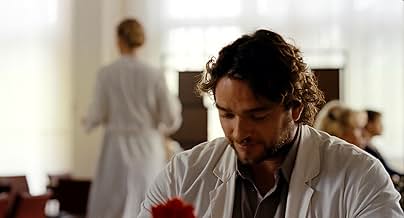IMDb रेटिंग
7.2/10
17 हज़ार
आपकी रेटिंग
अपनी भाषा में प्लॉट जोड़ेंA doctor working in 1980s East Germany finds herself banished to a small country hospital.A doctor working in 1980s East Germany finds herself banished to a small country hospital.A doctor working in 1980s East Germany finds herself banished to a small country hospital.
- पुरस्कार
- 10 जीत और कुल 24 नामांकन
Claudia Geisler-Bading
- Stationsschwester Schlösser
- (as Claudia Geisler)
फ़ीचर्ड समीक्षाएं
It's 1980 East Germany. Dr Barbara Wolff (Nina Hoss) is new in the backwaters hospital. She has isolated herself from all her colleagues. The secret police Stasi is keeping track of her for applying for an exit visa and she lost her job at a prestigious hospital in East Berlin. She can trust nobody even the chief doctor Reiser. There is a patient named Stella that has developed an attachment to Barbara. She is pregnant and is desperate to flee to the West.
I love the idea of this story. This should be a tense thriller of paranoia and fear. Instead this is slow moving, reserved emotionally and quiet. The long takes, medium shots, and the stoic performances strip the movie of its tension. The fact that she is holding her feelings so tightly may be fitting for the story. It doesn't always allow people to feel her fears. It's a specific way to do this story and it works on that level.
I love the idea of this story. This should be a tense thriller of paranoia and fear. Instead this is slow moving, reserved emotionally and quiet. The long takes, medium shots, and the stoic performances strip the movie of its tension. The fact that she is holding her feelings so tightly may be fitting for the story. It doesn't always allow people to feel her fears. It's a specific way to do this story and it works on that level.
It's a challenging task to depict a bygone era which hasn't yet passed into history, but is a living memory in the minds of many. Distant events may be easily interpreted at will, because no spectator can expect a minute reconstruction of a reality past. Adaptations of recent events, however, fall under close scrutiny of those who were actually there, and any attempt to 'tell the whole story' will invariably meet with criticism from those who feel left out of the picture, or who remember differently. It is therefore the best solution for the film maker to focus on atmosphere rather than events, and a simple story rather than a complex rendition of society as a whole. And that's what director/ screenwriter Christian Petzold does: he tells the story of a doctor, displaced from the capital to the province for an application to leave the country, and confronting an atmosphere of distrust while preparing her escape to the West. This routine of hostility is a little ameliorated by the interest of a male colleague, who may however be an assigned informer, and the friendship to a pregnant patient, who apparently escaped from a juvenile offenders camp only to be recaptured.
What makes me consider this film as far superior to the much lauded, Oscar-winning 'The Lives of Others' is that it does not sacrifice atmosphere to film making conventions. For instance, there is no music, because there was no music. 'The Lives of Others' tormented any actual witness of the times it described with a sappy soundtrack. It also did not correspond to my recollections of East Germany because it limited the supervision of ordinary citizens to the Stasi ('State Security') and its collaborators. It did point out that this supervision was omnipresent, but it created a division between good and evil which was slowly eroded from the evil side's end. 'Barbara', however, focuses on the way ordinary citizens, not intellectuals, were treated, and the fact that virtually everyone collaborated in the supervision of the individual, whether they were working with the Stasi or not. Barbara is fully aware of her situation, and tries to make friends with her colleague/informer André Reiser to win him over to her side, while at the same time not giving anything away about herself. Reiser, on the other hand, tries to gain her trust as a person, because he needs her competence at work and may be romantically interested in her, while at the same time fulfilling his obligations to report on her.
This constant game of hide and seek illustrates what Socialism was really like - a permanent grey zone in which you had to measure your steps carefully and no clear distinctions between good and evil existed, as 'The Lives of Others' would have you believe; and the young patient side characters show that quite a few cracked under this immense pressure. By focusing on one woman's story, director Petzold delivers an accurate portrait of the realities of life at that time: it did not matter whether you were good at your job or not, and being too good made you automatically suspicious, while being lazy made you the target of accusations of boycotting society; it was dangerous to open up to colleagues, because they would almost certainly be inquired about what you said, but at the same time it was dangerous to distance yourself, because then you'd be suspected of having something to hide. Everything was tactics, nothing was spontaneous, everybody wanted to get out, but chastised those who actually tried. This authenticity has probably prompted this film's selection as the German candidate for the foreign language Oscar 2013, but it may also have hampered its chances to win the Golden Bear upon its premiere at the Berlin Film Festival, where Petzold won the director's prize though. Realism makes for an accurate portrayal of the recent past, but for those who have not been there, 'Barbara' may be a bit too stiff and gloomy, because it does not compromise its authenticity to the expectations of (Western) audiences.
What makes me consider this film as far superior to the much lauded, Oscar-winning 'The Lives of Others' is that it does not sacrifice atmosphere to film making conventions. For instance, there is no music, because there was no music. 'The Lives of Others' tormented any actual witness of the times it described with a sappy soundtrack. It also did not correspond to my recollections of East Germany because it limited the supervision of ordinary citizens to the Stasi ('State Security') and its collaborators. It did point out that this supervision was omnipresent, but it created a division between good and evil which was slowly eroded from the evil side's end. 'Barbara', however, focuses on the way ordinary citizens, not intellectuals, were treated, and the fact that virtually everyone collaborated in the supervision of the individual, whether they were working with the Stasi or not. Barbara is fully aware of her situation, and tries to make friends with her colleague/informer André Reiser to win him over to her side, while at the same time not giving anything away about herself. Reiser, on the other hand, tries to gain her trust as a person, because he needs her competence at work and may be romantically interested in her, while at the same time fulfilling his obligations to report on her.
This constant game of hide and seek illustrates what Socialism was really like - a permanent grey zone in which you had to measure your steps carefully and no clear distinctions between good and evil existed, as 'The Lives of Others' would have you believe; and the young patient side characters show that quite a few cracked under this immense pressure. By focusing on one woman's story, director Petzold delivers an accurate portrait of the realities of life at that time: it did not matter whether you were good at your job or not, and being too good made you automatically suspicious, while being lazy made you the target of accusations of boycotting society; it was dangerous to open up to colleagues, because they would almost certainly be inquired about what you said, but at the same time it was dangerous to distance yourself, because then you'd be suspected of having something to hide. Everything was tactics, nothing was spontaneous, everybody wanted to get out, but chastised those who actually tried. This authenticity has probably prompted this film's selection as the German candidate for the foreign language Oscar 2013, but it may also have hampered its chances to win the Golden Bear upon its premiere at the Berlin Film Festival, where Petzold won the director's prize though. Realism makes for an accurate portrayal of the recent past, but for those who have not been there, 'Barbara' may be a bit too stiff and gloomy, because it does not compromise its authenticity to the expectations of (Western) audiences.
BARBARA may be a little too slow and humorless for many tastes, but it's one of those films that's so real it hardly seems like a film at all. You have to admire the stark realism here. Whether you want to go there or not, this film truly takes you to a secluded province of East Germany, 1980. BARBARA affords an acute look at the inside of a totalitarian state. While it doesn't show a whole lot in this regard, what it does is shown most effectively. The lack of any soundtrack--something I didn't even notice while viewing but that one of the reviews on Amazon pointed out--only adds to BARBARA's immediacy. Quietly immersing, with a real surprise at the end. Excellent cinematography and fine acting by all.
Looking back at 1980 East Germany director Christian Petzold conjures up a dreary Orwellian world of suppressed emotions, police state invasiveness and a simmering yearning for something better. The work of Cinematographer Hans Fromm creates an atmosphere of almost perpetual colorless twilight and Petzold's laconic scenes and long takes create a subtle but omnipresent feeling of oppression and paranoia.
In a beautifully understated performance Nina Hoss (Barbara) is a doctor whose desire to leave East Germany results in her being punished through relocation to a rural village clinic where she encounters clinic chief Ronald Zehrfeld (Dr. Reiser). Reiser appears to be sympathetic but she is reluctant to trust him. Jasna Fritzi Bauer is Stella a young girl who constantly escapes juvenile work camps seeking refuge at the clinic. Mark Waschke is Jorg a well-to-do foreigner who loves Barbara and offers to help her escape to Denmark where they can be together. Rainer Bock is a Stasi officer who periodically subjects Barbara to strip searches in an attempt to harass and prevent her from fleeing.
"Barbara" is a quiet character piece. It's a subtle, tense, humanistic drama not ideally suited for audiences of plot-driven pictures. Nina Hoss deserves serious consideration from the Academy as hers is one of the best performances by an actress this year.
In a beautifully understated performance Nina Hoss (Barbara) is a doctor whose desire to leave East Germany results in her being punished through relocation to a rural village clinic where she encounters clinic chief Ronald Zehrfeld (Dr. Reiser). Reiser appears to be sympathetic but she is reluctant to trust him. Jasna Fritzi Bauer is Stella a young girl who constantly escapes juvenile work camps seeking refuge at the clinic. Mark Waschke is Jorg a well-to-do foreigner who loves Barbara and offers to help her escape to Denmark where they can be together. Rainer Bock is a Stasi officer who periodically subjects Barbara to strip searches in an attempt to harass and prevent her from fleeing.
"Barbara" is a quiet character piece. It's a subtle, tense, humanistic drama not ideally suited for audiences of plot-driven pictures. Nina Hoss deserves serious consideration from the Academy as hers is one of the best performances by an actress this year.
Barbara (2012)
A somber, tightly scripted, almost old-fashioned film. I can picture this in black white, or a movie not only set in 1980 but shot then, too. I mean this all as a compliment.
It's key to know that this is Communist East Germany, a closed country under Soviet influence and generally struggling to keep up with West Germany. The doldrums depicted, and the lower quality of medical care at this small provincial clinic, are very real.
The title character is a downtrodden doctor who was caught trying to escape to the West, and was sent to the boondocks as punishment. And she is periodically searched by the authorities, who go through her apartment, her body cavities, her entire personal life while she passively waits. It's awful. And very real.
There is a steady vague story line showing Barbara's contacts to sympathetic Germans, and it seems one or two of them are visiting now and then from the West. Clandestine meetings with money (and sex) continue in the woods, but these are minor points in her steady work as a doctor in the clinic.
More important, it turns out, is the cute and steady-handed male doctor who runs the clinic. She doesn't trust him. If he asks questions out of curiosity she isn't sure if he's a spy or just a nice guy. We aren't sure either. His life is simple and has simple pleasures, and he likes her and tries to make her open up and actually smile, which turns out to be the hardest thing in the whole movie.
Barbara's plans to escape seem to be threatened by her job commitment, which she can't shirk because it'll draw attention to her irregularities. And so things go in this windy, North German countryside. It's so beautifully, patiently wrought, you have to watch and wait, just as passively as Barbara. It's sad, for sure, and yet there are these small glimmers. For one thing, there is the idea that no matter what your circumstances there is always the ability to be good and to do good. The male doctor is the example of this, and Barbara begins to see something more genuine at work than her own superficial (we assume) strivings for a consumerist West.
It's odd to see such a balanced and yet truthful view of Communist Germany. The oppression is real and bad, but the strivings of regular people (doctors and others) make hope possible. I loved this movie, even though fairly little happens, and there are few turns of the plot that are clearly for dramatic impact more than an integral building of character. But these are small caveats. The total effect is simple and penetrating, with a beautiful ending.
A somber, tightly scripted, almost old-fashioned film. I can picture this in black white, or a movie not only set in 1980 but shot then, too. I mean this all as a compliment.
It's key to know that this is Communist East Germany, a closed country under Soviet influence and generally struggling to keep up with West Germany. The doldrums depicted, and the lower quality of medical care at this small provincial clinic, are very real.
The title character is a downtrodden doctor who was caught trying to escape to the West, and was sent to the boondocks as punishment. And she is periodically searched by the authorities, who go through her apartment, her body cavities, her entire personal life while she passively waits. It's awful. And very real.
There is a steady vague story line showing Barbara's contacts to sympathetic Germans, and it seems one or two of them are visiting now and then from the West. Clandestine meetings with money (and sex) continue in the woods, but these are minor points in her steady work as a doctor in the clinic.
More important, it turns out, is the cute and steady-handed male doctor who runs the clinic. She doesn't trust him. If he asks questions out of curiosity she isn't sure if he's a spy or just a nice guy. We aren't sure either. His life is simple and has simple pleasures, and he likes her and tries to make her open up and actually smile, which turns out to be the hardest thing in the whole movie.
Barbara's plans to escape seem to be threatened by her job commitment, which she can't shirk because it'll draw attention to her irregularities. And so things go in this windy, North German countryside. It's so beautifully, patiently wrought, you have to watch and wait, just as passively as Barbara. It's sad, for sure, and yet there are these small glimmers. For one thing, there is the idea that no matter what your circumstances there is always the ability to be good and to do good. The male doctor is the example of this, and Barbara begins to see something more genuine at work than her own superficial (we assume) strivings for a consumerist West.
It's odd to see such a balanced and yet truthful view of Communist Germany. The oppression is real and bad, but the strivings of regular people (doctors and others) make hope possible. I loved this movie, even though fairly little happens, and there are few turns of the plot that are clearly for dramatic impact more than an integral building of character. But these are small caveats. The total effect is simple and penetrating, with a beautiful ending.
क्या आपको पता है
- ट्रिवियाThe Torgau workhouse to which Stella is sent is the Torgau Juvenile Detention Centre. The Centre, which ran from 1964 to 1989, was for the "re-education" of young people aged 14 to 18. Inmates had committed no crimes, but were deemed to need education so that they could fit in with the norms of socialist life in East Germany.
- गूफ़Andre hands Barbara a cup of coffee, which she promptly drops. You see the shattered pieces of the cup on the floor, but no coffee.
- भाव
André: Doctor Wolff will be working with us. She is from Berlin... from the Charite Hospital, and has decided...
Assistenzärztin Schulze: We have introduced ourselves.
- साउंडट्रैकNocturne g-moll Opus 15 No. 3
Composed by Frédéric Chopin
टॉप पसंद
रेटिंग देने के लिए साइन-इन करें और वैयक्तिकृत सुझावों के लिए वॉचलिस्ट करें
- How long is Barbara?Alexa द्वारा संचालित
विवरण
- रिलीज़ की तारीख़
- कंट्री ऑफ़ ओरिजिन
- आधिकारिक साइटें
- भाषा
- इस रूप में भी जाना जाता है
- Bárbara
- फ़िल्माने की जगहें
- उत्पादन कंपनियां
- IMDbPro पर और कंपनी क्रेडिट देखें
बॉक्स ऑफ़िस
- US और कनाडा में सकल
- $10,13,902
- US और कनाडा में पहले सप्ताह में कुल कमाई
- $63,410
- 23 दिस॰ 2012
- दुनिया भर में सकल
- $69,08,277
- चलने की अवधि1 घंटा 45 मिनट
- रंग
- ध्वनि मिश्रण
- पक्ष अनुपात
- 1.85 : 1
इस पेज में योगदान दें
किसी बदलाव का सुझाव दें या अनुपलब्ध कॉन्टेंट जोड़ें





























